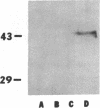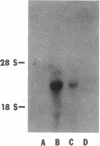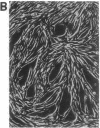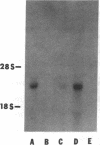Abstract
Serum-free mouse embryo (SFME) cells, derived in medium in which serum is replaced with growth factors and other supplements, display distinctive properties: (i) SFME cells do not lose proliferative potential or show gross chromosomal aberration upon extended culture, (ii) these cells depend on epidermal growth factor for survival; and (iii) SFME cell proliferation is reversibly inhibited by serum. Treatment of SFME cells with serum or transforming growth factor beta led to the appearance of glial fibrillary acidic protein, a specific marker for astrocytes. The appearance of glial fibrillary acidic protein in cultures was reversed upon removal of transforming growth factor beta or serum. Cells with properties similar to SFME cells were also isolated from adult mouse brain. These results suggest a role for transforming growth factor beta in astrocyte differentiation in developing organisms and in response to injury and identify the cell type that has the unusual properties of SFME cells.
Full text
PDF
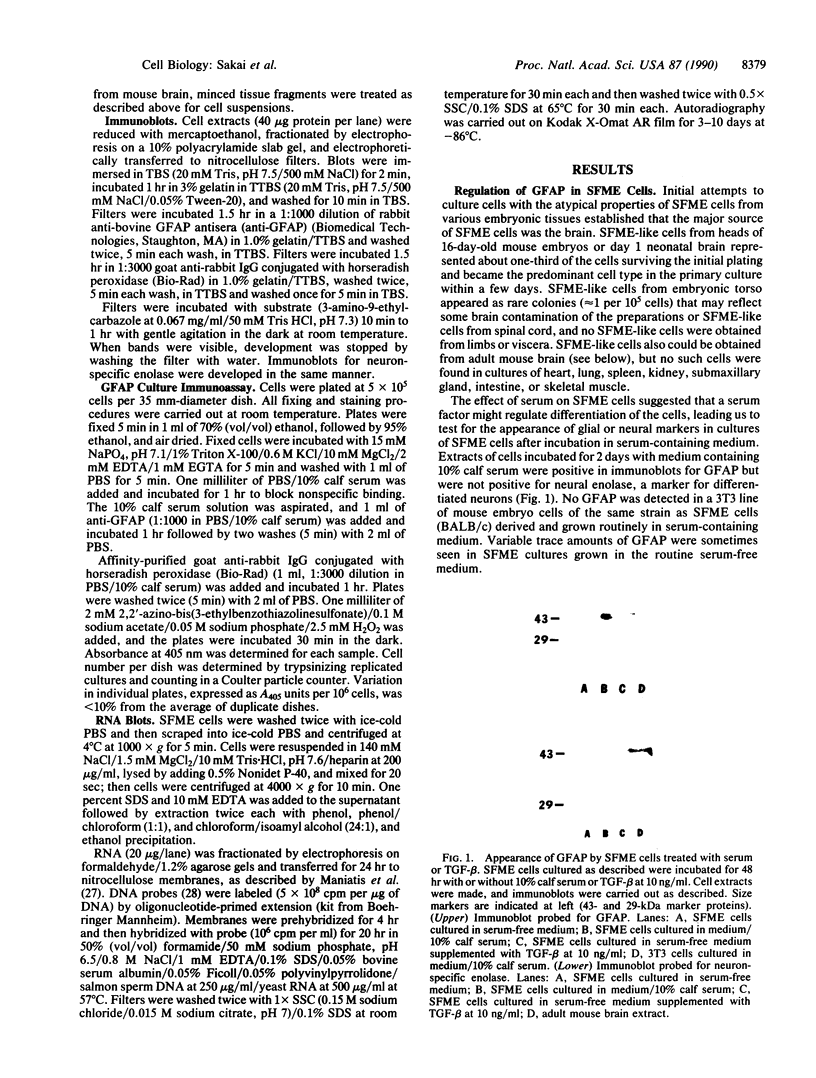
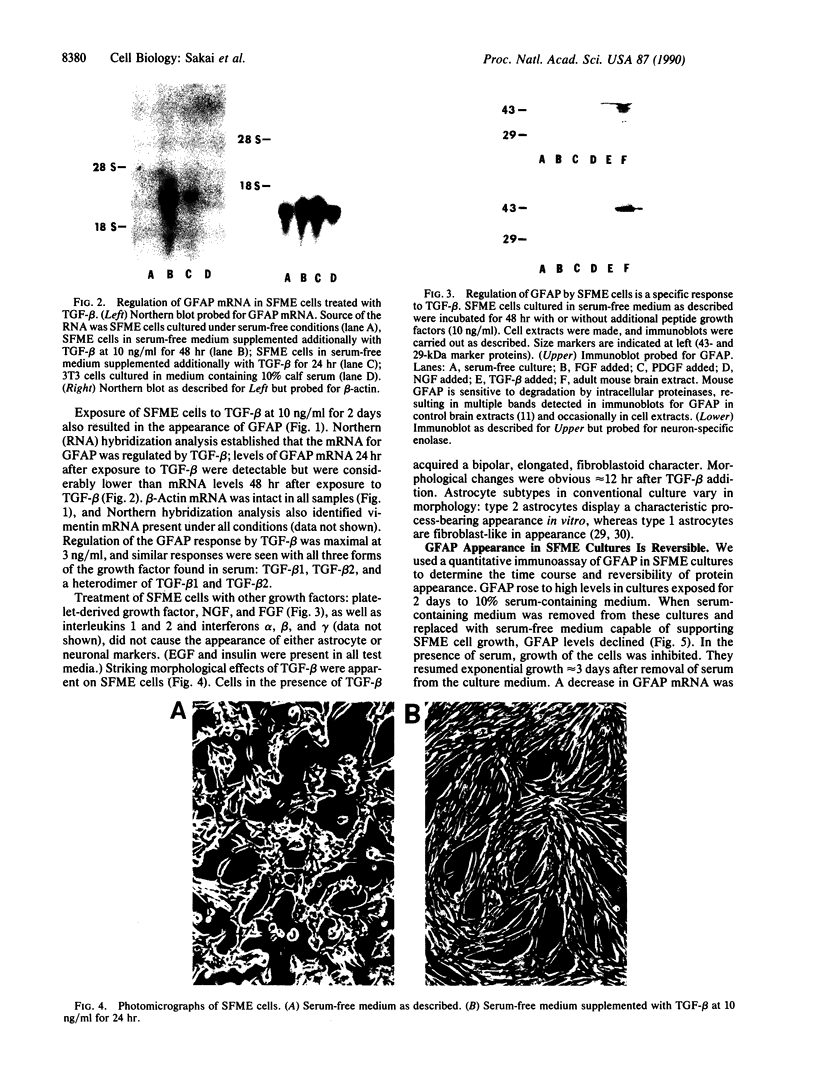
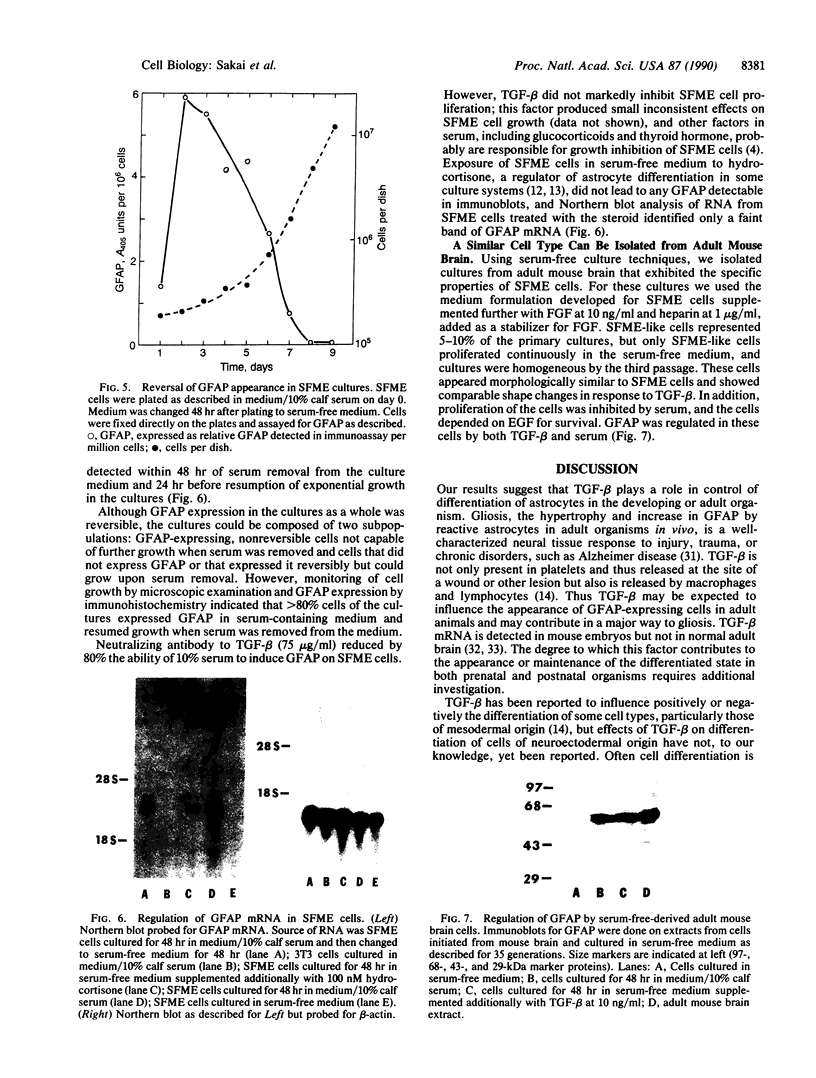
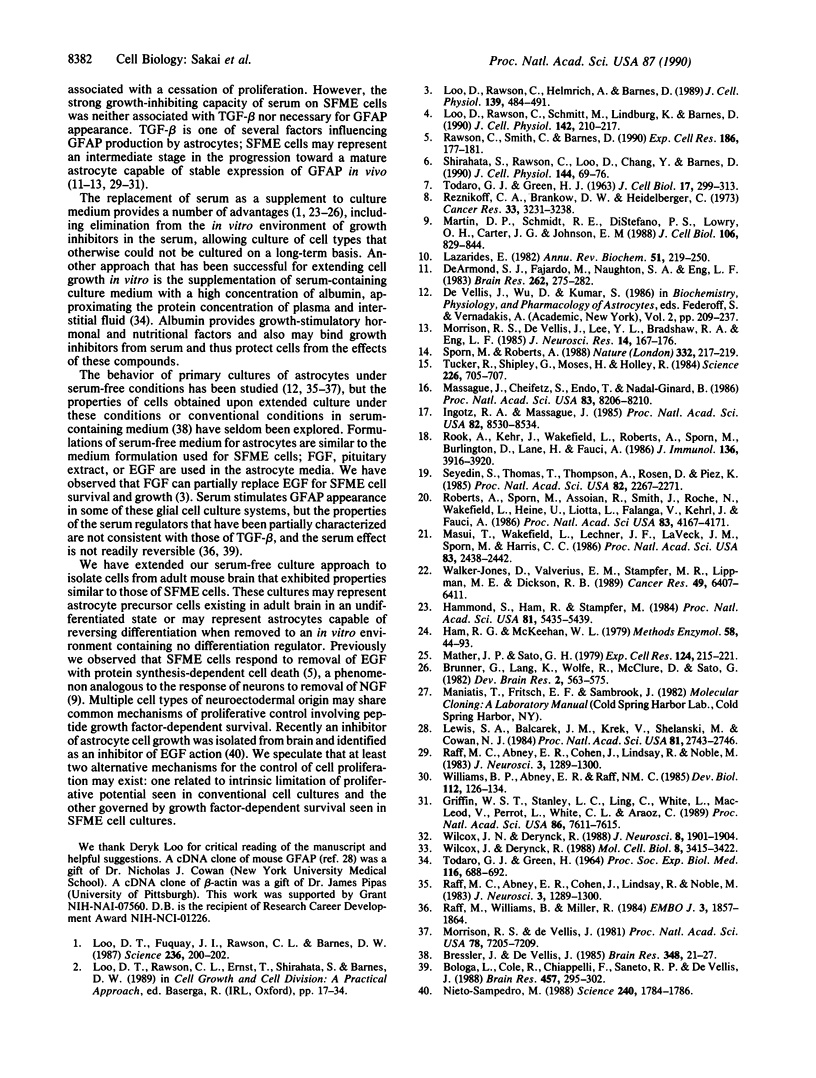
Images in this article
Selected References
These references are in PubMed. This may not be the complete list of references from this article.
- Bologa L., Cole R., Chiappelli F., Saneto R. P., De Vellis J. Expression of glial fibrillary acidic protein by differentiated astrocytes is regulated by serum antagonistic factors. Brain Res. 1988 Aug 9;457(2):295–302. doi: 10.1016/0006-8993(88)90699-3. [DOI] [PubMed] [Google Scholar]
- Bressler J. P., de Vellis J. Neoplastic transformation of newborn rat astrocytes in culture. Brain Res. 1985 Nov 25;348(1):21–27. doi: 10.1016/0006-8993(85)90354-3. [DOI] [PubMed] [Google Scholar]
- DeArmond S. J., Fajardo M., Naughton S. A., Eng L. F. Degradation of glial fibrillary acidic protein by a calcium dependent proteinase: an electroblot study. Brain Res. 1983 Mar 7;262(2):275–282. doi: 10.1016/0006-8993(83)91018-1. [DOI] [PubMed] [Google Scholar]
- Griffin W. S., Stanley L. C., Ling C., White L., MacLeod V., Perrot L. J., White C. L., 3rd, Araoz C. Brain interleukin 1 and S-100 immunoreactivity are elevated in Down syndrome and Alzheimer disease. Proc Natl Acad Sci U S A. 1989 Oct;86(19):7611–7615. doi: 10.1073/pnas.86.19.7611. [DOI] [PMC free article] [PubMed] [Google Scholar]
- Ham R. G., McKeehan W. L. Media and growth requirements. Methods Enzymol. 1979;58:44–93. doi: 10.1016/s0076-6879(79)58126-9. [DOI] [PubMed] [Google Scholar]
- Hammond S. L., Ham R. G., Stampfer M. R. Serum-free growth of human mammary epithelial cells: rapid clonal growth in defined medium and extended serial passage with pituitary extract. Proc Natl Acad Sci U S A. 1984 Sep;81(17):5435–5439. doi: 10.1073/pnas.81.17.5435. [DOI] [PMC free article] [PubMed] [Google Scholar]
- Ignotz R. A., Massagué J. Type beta transforming growth factor controls the adipogenic differentiation of 3T3 fibroblasts. Proc Natl Acad Sci U S A. 1985 Dec;82(24):8530–8534. doi: 10.1073/pnas.82.24.8530. [DOI] [PMC free article] [PubMed] [Google Scholar]
- Lazarides E. Intermediate filaments: a chemically heterogeneous, developmentally regulated class of proteins. Annu Rev Biochem. 1982;51:219–250. doi: 10.1146/annurev.bi.51.070182.001251. [DOI] [PubMed] [Google Scholar]
- Lewis S. A., Balcarek J. M., Krek V., Shelanski M., Cowan N. J. Sequence of a cDNA clone encoding mouse glial fibrillary acidic protein: structural conservation of intermediate filaments. Proc Natl Acad Sci U S A. 1984 May;81(9):2743–2746. doi: 10.1073/pnas.81.9.2743. [DOI] [PMC free article] [PubMed] [Google Scholar]
- Loo D. T., Fuquay J. I., Rawson C. L., Barnes D. W. Extended culture of mouse embryo cells without senescence: inhibition by serum. Science. 1987 Apr 10;236(4798):200–202. doi: 10.1126/science.3494308. [DOI] [PubMed] [Google Scholar]
- Loo D., Rawson C., Helmrich A., Barnes D. Serum-free mouse embryo cells: growth responses in vitro. J Cell Physiol. 1989 Jun;139(3):484–491. doi: 10.1002/jcp.1041390306. [DOI] [PubMed] [Google Scholar]
- Loo D., Rawson C., Schmitt M., Lindburg K., Barnes D. Glucocorticoid and thyroid hormones inhibit proliferation of serum-free mouse embryo (SFME) cells. J Cell Physiol. 1990 Jan;142(1):210–217. doi: 10.1002/jcp.1041420126. [DOI] [PubMed] [Google Scholar]
- Martin D. P., Schmidt R. E., DiStefano P. S., Lowry O. H., Carter J. G., Johnson E. M., Jr Inhibitors of protein synthesis and RNA synthesis prevent neuronal death caused by nerve growth factor deprivation. J Cell Biol. 1988 Mar;106(3):829–844. doi: 10.1083/jcb.106.3.829. [DOI] [PMC free article] [PubMed] [Google Scholar]
- Massagué J., Cheifetz S., Endo T., Nadal-Ginard B. Type beta transforming growth factor is an inhibitor of myogenic differentiation. Proc Natl Acad Sci U S A. 1986 Nov;83(21):8206–8210. doi: 10.1073/pnas.83.21.8206. [DOI] [PMC free article] [PubMed] [Google Scholar]
- Masui T., Wakefield L. M., Lechner J. F., LaVeck M. A., Sporn M. B., Harris C. C. Type beta transforming growth factor is the primary differentiation-inducing serum factor for normal human bronchial epithelial cells. Proc Natl Acad Sci U S A. 1986 Apr;83(8):2438–2442. doi: 10.1073/pnas.83.8.2438. [DOI] [PMC free article] [PubMed] [Google Scholar]
- Mather J. P., Sato G. H. The use of hormone-supplemented serum-free media in primary cultures. Exp Cell Res. 1979 Nov;124(1):215–221. doi: 10.1016/0014-4827(79)90271-4. [DOI] [PubMed] [Google Scholar]
- Morrison R. S., De Vellis J., Lee Y. L., Bradshaw R. A., Eng L. F. Hormones and growth factors induce the synthesis of glial fibrillary acidic protein in rat brain astrocytes. J Neurosci Res. 1985;14(2):167–176. doi: 10.1002/jnr.490140202. [DOI] [PubMed] [Google Scholar]
- Morrison R. S., de Vellis J. Growth of purified astrocytes in a chemically defined medium. Proc Natl Acad Sci U S A. 1981 Nov;78(11):7205–7209. doi: 10.1073/pnas.78.11.7205. [DOI] [PMC free article] [PubMed] [Google Scholar]
- Nieto-Sampedro M. Astrocyte mitogen inhibitor related to epidermal growth factor receptor. Science. 1988 Jun 24;240(4860):1784–1786. doi: 10.1126/science.3289118. [DOI] [PubMed] [Google Scholar]
- Raff M. C., Abney E. R., Cohen J., Lindsay R., Noble M. Two types of astrocytes in cultures of developing rat white matter: differences in morphology, surface gangliosides, and growth characteristics. J Neurosci. 1983 Jun;3(6):1289–1300. doi: 10.1523/JNEUROSCI.03-06-01289.1983. [DOI] [PMC free article] [PubMed] [Google Scholar]
- Raff M. C., Abney E. R., Cohen J., Lindsay R., Noble M. Two types of astrocytes in cultures of developing rat white matter: differences in morphology, surface gangliosides, and growth characteristics. J Neurosci. 1983 Jun;3(6):1289–1300. doi: 10.1523/JNEUROSCI.03-06-01289.1983. [DOI] [PMC free article] [PubMed] [Google Scholar]
- Raff M. C., Williams B. P., Miller R. H. The in vitro differentiation of a bipotential glial progenitor cell. EMBO J. 1984 Aug;3(8):1857–1864. doi: 10.1002/j.1460-2075.1984.tb02059.x. [DOI] [PMC free article] [PubMed] [Google Scholar]
- Rawson C., Cosola-Smith C., Barnes D. Death of serum-free mouse embryo cells caused by epidermal growth factor deprivation is prevented by cycloheximide, 12-O-tetradecanoylphorbol-13-acetate, or vanadate. Exp Cell Res. 1990 Jan;186(1):177–181. doi: 10.1016/0014-4827(90)90224-x. [DOI] [PubMed] [Google Scholar]
- Reznikoff C. A., Brankow D. W., Heidelberger C. Establishment and characterization of a cloned line of C3H mouse embryo cells sensitive to postconfluence inhibition of division. Cancer Res. 1973 Dec;33(12):3231–3238. [PubMed] [Google Scholar]
- Roberts A. B., Sporn M. B., Assoian R. K., Smith J. M., Roche N. S., Wakefield L. M., Heine U. I., Liotta L. A., Falanga V., Kehrl J. H. Transforming growth factor type beta: rapid induction of fibrosis and angiogenesis in vivo and stimulation of collagen formation in vitro. Proc Natl Acad Sci U S A. 1986 Jun;83(12):4167–4171. doi: 10.1073/pnas.83.12.4167. [DOI] [PMC free article] [PubMed] [Google Scholar]
- Rook A. H., Kehrl J. H., Wakefield L. M., Roberts A. B., Sporn M. B., Burlington D. B., Lane H. C., Fauci A. S. Effects of transforming growth factor beta on the functions of natural killer cells: depressed cytolytic activity and blunting of interferon responsiveness. J Immunol. 1986 May 15;136(10):3916–3920. [PubMed] [Google Scholar]
- Seyedin S. M., Thomas T. C., Thompson A. Y., Rosen D. M., Piez K. A. Purification and characterization of two cartilage-inducing factors from bovine demineralized bone. Proc Natl Acad Sci U S A. 1985 Apr;82(8):2267–2271. doi: 10.1073/pnas.82.8.2267. [DOI] [PMC free article] [PubMed] [Google Scholar]
- Shirahata S., Rawson C., Loo D., Chang Y. J., Barnes D. ras and neu oncogenes reverse serum inhibition and epidermal growth factor dependence of serum-free mouse embryo cells. J Cell Physiol. 1990 Jul;144(1):69–76. doi: 10.1002/jcp.1041440110. [DOI] [PubMed] [Google Scholar]
- Sporn M. B., Roberts A. B. Peptide growth factors are multifunctional. Nature. 1988 Mar 17;332(6161):217–219. doi: 10.1038/332217a0. [DOI] [PubMed] [Google Scholar]
- TODARO G. J., GREEN H. Quantitative studies of the growth of mouse embryo cells in culture and their development into established lines. J Cell Biol. 1963 May;17:299–313. doi: 10.1083/jcb.17.2.299. [DOI] [PMC free article] [PubMed] [Google Scholar]
- TODARO G. J., GREEN H. SERUM ALBUMIN SUPPLEMENTED MEDIUM FOR LONG TERM CULTIVATION OF MAMMALIAN FIBROBLAST STRAINS. Proc Soc Exp Biol Med. 1964 Jul;116:688–692. doi: 10.3181/00379727-116-29346. [DOI] [PubMed] [Google Scholar]
- Tucker R. F., Shipley G. D., Moses H. L., Holley R. W. Growth inhibitor from BSC-1 cells closely related to platelet type beta transforming growth factor. Science. 1984 Nov 9;226(4675):705–707. doi: 10.1126/science.6093254. [DOI] [PubMed] [Google Scholar]
- Walker-Jones D., Valverius E. M., Stampfer M. R., Lippman M. E., Dickson R. B. Stimulation of epithelial membrane antigen expression by transforming growth factor-beta in normal and oncogene-transformed human mammary epithelial cells. Cancer Res. 1989 Nov 15;49(22):6407–6411. [PubMed] [Google Scholar]
- Wilcox J. N., Derynck R. Developmental expression of transforming growth factors alpha and beta in mouse fetus. Mol Cell Biol. 1988 Aug;8(8):3415–3422. doi: 10.1128/mcb.8.8.3415. [DOI] [PMC free article] [PubMed] [Google Scholar]
- Wilcox J. N., Derynck R. Localization of cells synthesizing transforming growth factor-alpha mRNA in the mouse brain. J Neurosci. 1988 Jun;8(6):1901–1904. doi: 10.1523/JNEUROSCI.08-06-01901.1988. [DOI] [PMC free article] [PubMed] [Google Scholar]
- Williams B. P., Abney E. R., Raff M. C. Macroglial cell development in embryonic rat brain: studies using monoclonal antibodies, fluorescence activated cell sorting, and cell culture. Dev Biol. 1985 Nov;112(1):126–134. doi: 10.1016/0012-1606(85)90126-5. [DOI] [PubMed] [Google Scholar]




